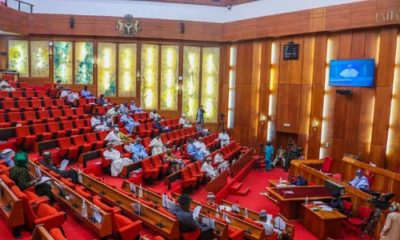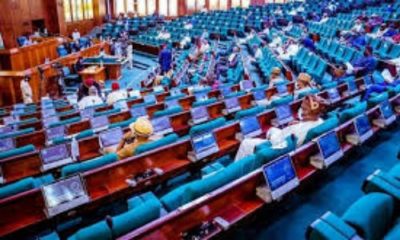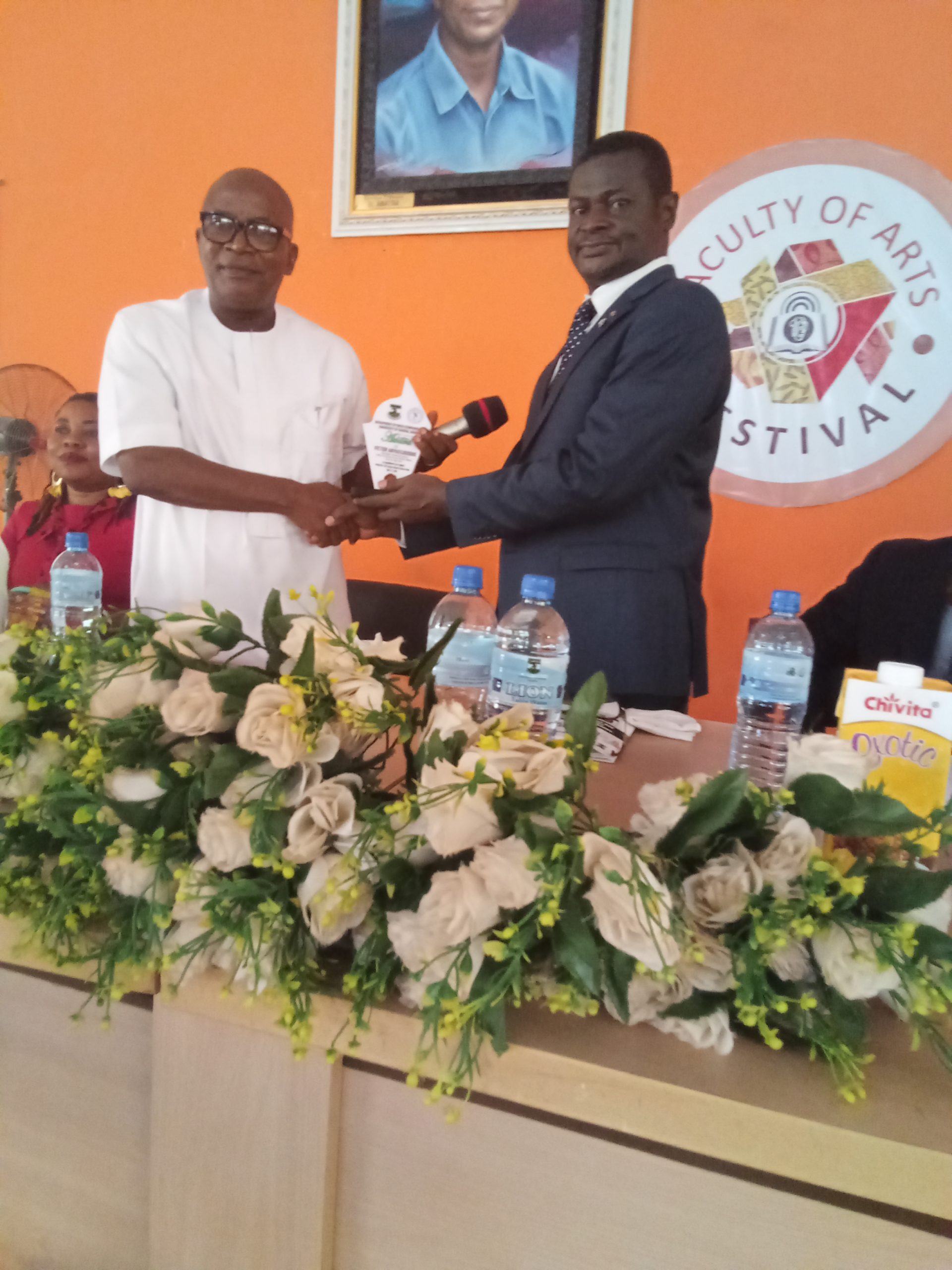NEWS
SERAP asks court to slash jumbo allowances for Buhari, Govs, NASS members
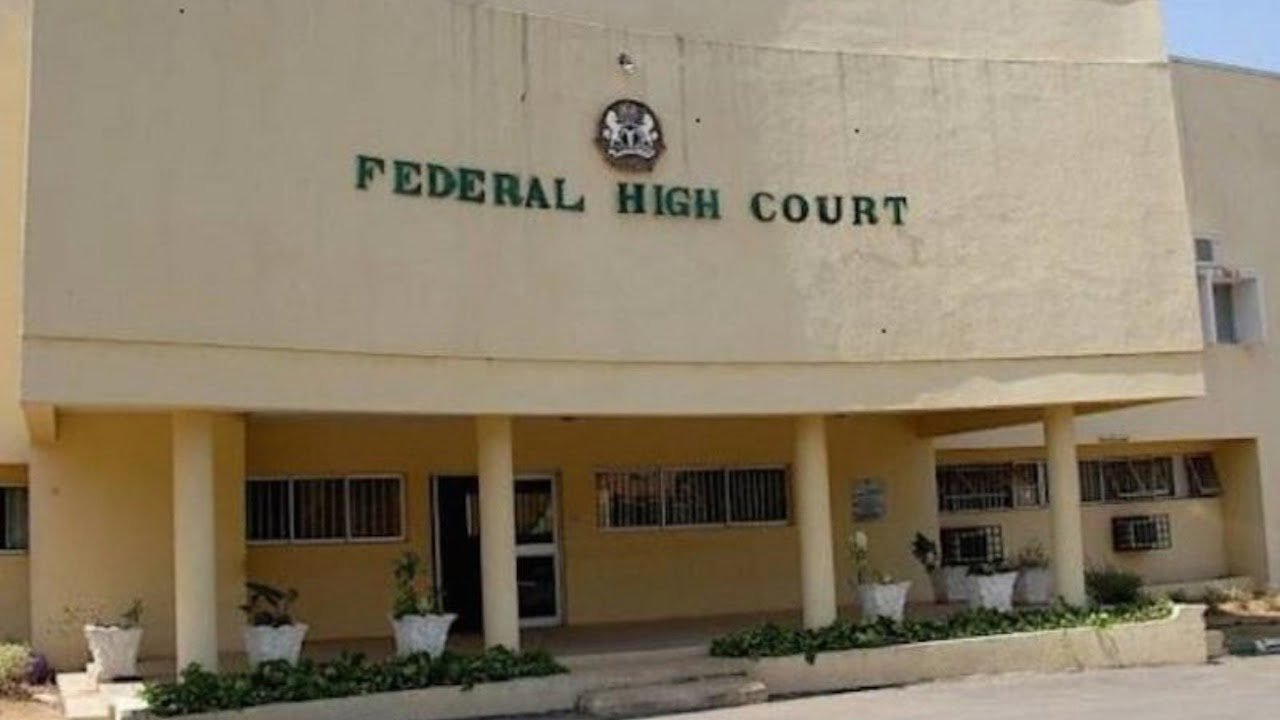
Precious ADELOLA
LAGOS-Socio-Economic Rights and Accountability Project (SERAP) has asked the Federal High Court in Abuja “to order the Revenue Mobilization Allocation and Fiscal Commission (RMAFC) and the National Salaries, Incomes and Wages Commission (NSIWC) to perform their statutory functions to review downward the remuneration and allowances of President Muhammadu Buhari, Vice-President Yemi Osinbajo, 36 governors and members of the National Assembly.”
SERAP is arguing that “slashing jumbo pay for these high-ranking political office-holders would reduce the unfair pay disparity between political officer holders and judicial officers, address the persistent poor treatment of judges, and improve access of victims of corruption to justice and effective remedies.”
In the suit number FHC/ABJ/CS/658/2021 filed last Friday, SERAP is seeking: “an order of mandamus to direct and compel the RMAFC to send its downward review of the remuneration and allowances of these high-ranking public office holders and recommendations to the National Assembly for appropriate remedial and legislative action, as provided for by the Nigerian Constitution 1999 [as amended].”
SERAP is also seeking “an order of mandamus to direct and compel the RMAFC to perform its mandatory constitutional duty to urgently review upward the remuneration, salaries and allowances, as well as the conditions of service for Nigerian judges.”
Joined in the suit as Respondents are Senate President, Ahmad Lawan; Speaker of House of Representatives, Femi Gbajabiamila, for themselves, and on behalf of all members of the Senate and House of Representative; and the National Judicial Council.
SERAP is arguing that: “While high-ranking political office-holders continue to enjoy lavish allowances, including life pensions, and access to security votes, which they have powers to spend as they wish, the remuneration and allowances of judges are grossly insufficient to enable them to maintain themselves and their families in reasonable comfort.”
According to SERAP: “The huge pay disparity between these high-ranking political officer-holders and judges is unfair, unjust and discriminatory, especially given the roles of judges to the people and the country.”
SERAP is also seeking “an order of mandamus to direct and compel NSIWC to perform its mandatory legal duty to urgently examine, streamline and recommend upward remuneration and allowances of Nigerian judges, and to recommend downward review of allowances of President Buhari, Vice-President Osinbajo, 36 governors and lawmakers to the National Assembly.”
The suit filed on behalf of SERAP by its lawyers Kolawole Oluwadare and Ms Adelanke Aremo, read in part: “the remuneration and allowances of judges have fallen substantially behind the average salaries and allowances of high-ranking political office-holders such as President, Vice-President, governors and lawmakers.”
“While government reviewed upward the salaries and allowances of political office holders on four occasions between May 1999 and March 2011, the salaries and allowances of judicial officers were only reviewed twice during the same period.”
“The review of the remuneration, allowances, and conditions of service for political, public and judicial office holders carried out by the RMAFC in 2009 shows huge disparity between the remuneration and allowances of judges and those of high-ranking political office-holders.”
“The NSIWC in a letter to SERAP admitted that it has powers to examine, streamline and recommend the salary scales applicable to each post in the public service but informed us to redirect our request to the RMAFC.”
“There is a legal duty upon the RMAFC to urgently review downward the remuneration and allowances of high-ranking political office-holders.”
“Judges should get all to which they are reasonably entitled, and it is unfair, illegal, unconstitutional, and discriminatory to continue to treat judges as second-class people while high-ranking political office-holders continue to enjoy lavish salaries and allowances.”
“Despite their important roles and responsibilities, Nigerian judges are poorly treated, particularly when their remuneration, salaries, allowances, and conditions of service are compared with that of political office-holders. Judges should not have to endure the most poignant financial worries.”
“The increase in the cost of living and the injustice of inadequate salaries bears heavily on judges, as it undermines their ability to effectively perform their judicial functions.”
“The roles and functions performed by judges across the country are second to none in their importance, including in facilitating access of victims of corruption and human rights violations to justice and effective remedies.”
“As a safeguard of judicial independence, the budget of the judiciary ought to be prepared in collaboration with the judiciary having regard to the peculiar needs and requirements of judicial administration.”
“The remuneration and pensions of judges must be secured by law at an adequate level that is consistent with their status and is sufficient to safeguard against conflict of interest and corruption.”
“Nigerians would continue to bear the brunt of denied access to justice, a better judiciary and a better administration of justice until judges across the country are paid what they rightly deserve.”
No date has been fixed for the hearing of the suit.
NEWS
Osun Logo Competition Closes, Panel of Judges Named

The Osun State Government has disclosed that submission of entries for the state’s logo design competition has come to an end.
This was contained in a statement in Osogbo on Friday.
Consequently, the state government has named a panel of judges to review the entries and nominate the first top three from the over hundred submissions.
According to the statement, “The panel includes veteran broadcaster, Olusola Ajala; brand specialist, Dayo Oderinu; senior bureaucrat, Moshood Suleiman; Segun Yedupe and ace graphic artist, Kazeem Olalekan.”
It added that the next step would be a review of all entries by the panel of judges, after which the best three designs would be unveiled by His Excellency, Governor Ademola Adeleke, on the 30th of April, 2024.
“As a Government, we are deeply impressed by the incredible talents demonstrated by every participant.
“The competition has once again proven the creativity and the abundance of talents possessed by Osun indigenes, whether at home or away,” it added.
The statement also noted that while the competition lasted, participants showed exceptional efforts as reflected in the thousands of entries recorded.
NEWS
Abuja American School Refunds $760k For Yahaya Bello’s Children – EFCC

The Economic and Financial Crimes Commission (EFCC) has acknowledged the reimbursement of $760,000.00 initially paid by former Kogi State Governor Yahaya Bello as advance school fees for his children attending the American International School, Abuja.
EFCC spokesperson Dele Oyewale confirmed this update in Abuja on Friday.
He said, “The school has refunded the entire $ 760, 000 to the EFCC’s recovery account.”
Earlier, the American International School of Abuja had urged the EFCC to provide valid banking information for the reimbursement of fees paid for the ex-governor’s children.
Allegedly, Bello used $720,000 from Kogi State Government funds to prepay tuition for five of his children enrolled in Grades 2 to 8.
Recall that on April 17, EFCC operatives besieged Bello’s residence in Abuja in a bid to apprehend him regarding an alleged N80.2 billion fraud.
During the operation at the residence, Kogi State Governor Usman Ododo reportedly arrived and escorted Bello away.
In a letter directed to the Lagos Zonal Commander of the EFCC, the school stated that $845,852 had been paid in tuition “from September 7, 2021, to the present.”
AISA noted that $760,910 is the refundable amount after deducting already provided educational services.
The letter reads “Please forward to us an official written request, with the authentic banking details of the EFCC, for the refund of the above-mentioned funds as previously indicated as part of your investigation into the alleged money laundering activities by the Bello family.
“Since the 7th September 2021 to date, $845,852.84 in tuition and other fees have been deposited into our bank account.
The calculated net amount to be transferred and refunded to the State, after deducting the rendered educational services, stands at $760,910.84.
“No further additional fees are anticipated for tuition as the students’ fees have been settled until their graduation from ASIA.”
The school stated that it would alert the anti-graft agency if any further deposits were made by the Bello family.
In a statement signed by Greg Hughes, AISA also disclosed, “Ali Bello contacted the school on Friday, August 13, 2021, requesting to prepay the family’s school fees until the students graduate from High School.”
EFCC Chairman, Ola Olukoyede previously disclosed that the former governor transferred $720,000 from the government’s funds to a bureau de change before leaving office, intending to prepay his child’s school fees.
Olukoyede made this revelation during an interview with journalists in Abuja on Tuesday.
He stated, “A sitting governor, because he knows he is going, moved money directly from government to bureau de change, used it to pay the child’s school fee in advance, $720,000 in advance, in anticipation that he was going to leave the Government House.
“In a poor state like Kogi, and you want me to close my eyes to that under the guise of ‘I’m being used.’ Being used by who at this stage of my life?”he added
NEWS
Entrenching Trust In Medical Laboratories Through Service Quality, ISO 15189 Accreditation
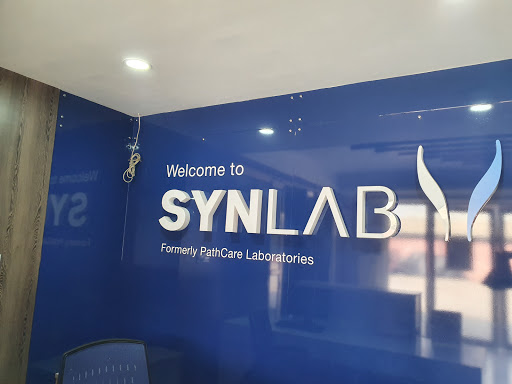
Relevant stakeholders opine that trust and quality are paramount in the realm of healthcare.
Patients rely on medical laboratories for accurate and reliable test results, as the foundation of diagnosis and treatment.
Hence, the ISO 15189 accreditation stands as a beacon, because it guides laboratories towards the establishment of a stringent quality management system.
Biztellers reports that the ISO 15189 is an international standard specific for medical laboratories. It outlines the requirements for quality and competence that laboratories need to meet to ensure accurate and reliable testing, calibration, and sampling processes.
This is why accreditation against this standard indicates that a laboratory has not just established, but is operating a quality management system and adheres to stringent requirements of the standard.
This clarification highlights the multifaceted benefits of ISO 15189 accreditation in enhancing patient trust and service quality within medical laboratories.
What then are the benefits of ISO 15189 accreditation to the provision of medical laboratory services?
A Vivid Scenario
Supposing that a patient, Adeola Adeolu (not real names), seeks diagnostic services at SYNLAB Nigeria.
And assuming that he was initially hesitant about the accuracy of test results, his concerns could be assuaged upon learning from his referral doctor that SYNLAB Nigeria does not compromise on quality because of its ISO 15189 accreditation.
Knowing that SYNLAB has this accreditation instills confidence in Adeolu, because it reinforces the reliability and credibility of the laboratory’s services.
Armed with the trust, Adeolu proceeds with the tests, confident in SYNLAB Nigeria’s commitment to excellence.
Biztellers shares below discerning members of the public look out for the ISO 15189
- ISO 15189 accreditation requires medical laboratories to adhere to a comprehensive framework for implementing quality management systems in order to ensure consistent and reliable test results. Such a guide enables organizations to access best practices and consistently implement them.
- Adhering to ISO 15189 standards requirements enhances patient safety by minimizing errors and ensuring accurate diagnostic outcomes. Adeolu’s confidence in accepting to run tests at SYNLAB Nigeria because of its ISO 15189 accreditation hinges on his belief that he would get accurate results.
- ISO 15189 accreditation elevates the global recognition of medical laboratories, facilitating collaborations and partnerships with healthcare institutions worldwide. Customers of an ISO 15189 certified laboratory can be confident that the result they receive from their laboratory will be acceptable across the globe.
- Accreditation under ISO 15189 indicates that the laboratory is meeting regulatory obligations, promoting ethical practices and is a legally responsible organization.
- Emphasizing staff competence and training, ISO 15189 accreditation affirms that laboratory personnel possess the necessary skills to maintain high-quality standards in laboratory operations. ISO 15189 accredited laboratories pay attention to staff training, recognizing that maintaining high quality requires having highly competent team.
- ISO 15189 standard requirements incorporate risk management principles, enabling laboratories to identify and mitigate potential risks effectively, thus ensuring patient safety. It fosters a culture of continuous improvement within medical laboratories, driving innovation and excellence in service delivery.
- ISO 15189 accreditation distinguishes laboratories as leaders in quality healthcare delivery, providing a competitive advantage and attracting patients and healthcare providers seeking reliable diagnostic services.
Conclusion
The ISO 15189 accreditation serves as a symbol for excellence in medical laboratories, enhancing patient trust and assuring service quality.
SYNLAB Nigeria’s embrace of this international standard and compliance with its requirements solidifies its position as a trusted partner in healthcare delivery. As the healthcare landscape evolves, ISO 15189 accreditation will remain indispensable tool, driving innovation, patient-centered care, and unwavering confidence in medical laboratories worldwide.
About SYNLAB Nigeria
SYNLAB Nigeria is a member of the SYNLAB group, with presence in 35 countries in four continents.
The organization has over 30 active locations across Nigeria and has been ISO 15189 certified since 2006.
SYNLAB Group is the leader in medical diagnostic services and specialty testing in Europe.
The Group offers a full range of innovative and reliable medical diagnostics to patients, practicing doctors, hospitals and clinics, governments and corporates.
Providing the leading level of service within the industry, SYNLAB is the partner of choice for routine and specialty diagnostics in human and veterinary medicine. The Group continuously innovates medical diagnostic services for the benefit of patients and customers.
SYNLAB holds leading positions in most markets, regularly reinforcing the strength of its network through a proven acquisition strategy.








